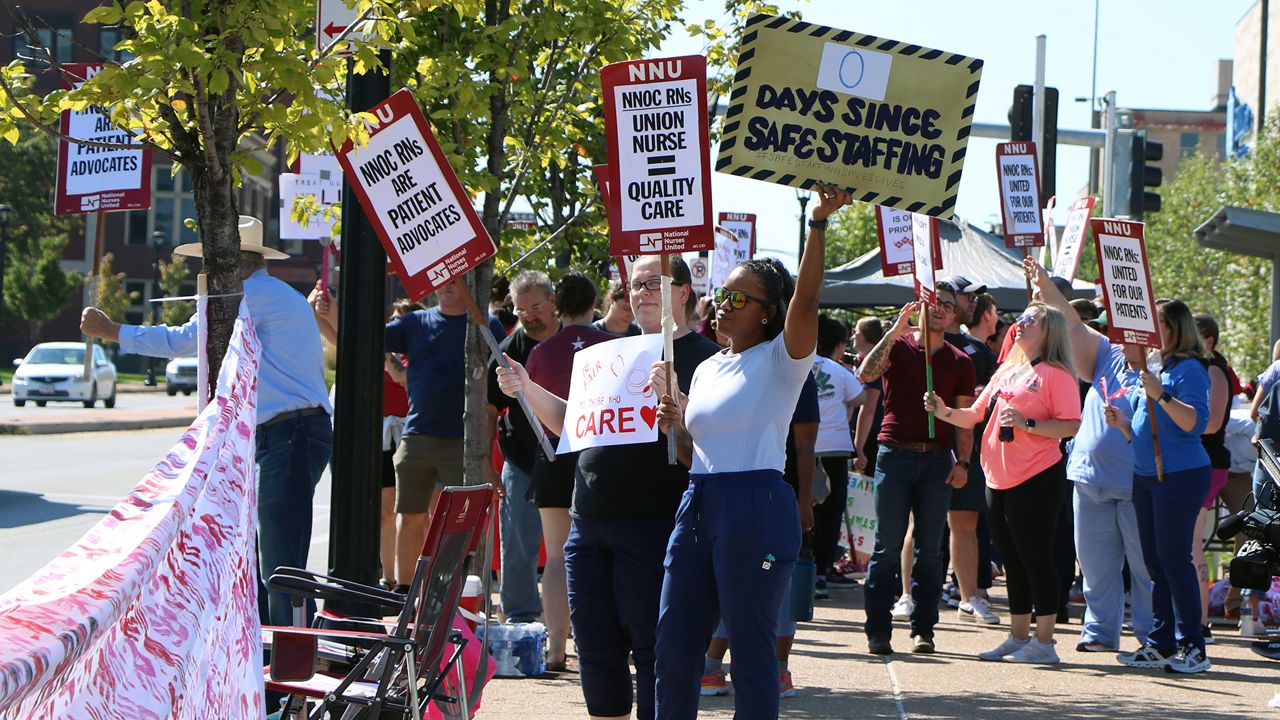ST. LOUIS — Dozens of SSM Health Saint Louis University Hospital nurses picketed Monday during the National Nurses Organizing Committee’s 24-hour strike where one member said nurses “don’t feel safe” at their job and are “being spread way too thin.”
The protest, which began Monday at 7 a.m. and will continue through Tuesday at 6:59 a.m., is regarding “deep concerns” such as patient care, safe staffing and workplace violence that have not been resolved through contract negotiations that started in May, according to an online press release.
“The biggest things that are causing us to come out here instead of being in there is because we don’t feel safe as nurses anymore,” SLU Hospital nurse and union member Jessica Tulk told Spectrum News.
The union said the hospital’s job vacancy rate has been above 30% since the spring of 2022 and that there’s been little movement in contract negotiations since they began in May.
Tulk said nursing licenses are being threatened because the nurses are being asked to care of an “unsafe amount” of patients.
“The patients that we see are so sick often that they do need a little bit more care, they need a little bit more time, they need a little bit more love and we are not able to give it to them,” Tulk said.
“As a result of that, a lot of patients are spending a lot of time waiting in the waiting room or waiting between interactions with doctors and nurses in their rooms, or waiting to go upstairs, or waiting for food, or waiting for any kind of attention or any sign that anybody within this hospital cares.
“And we’re having such a hard time being able to provide the type of care and the level of care that they need because we’re just being spread way too thin.”
Nurses have been without a contract since June 15 and there have been 19 bargaining sessions with management, averaging a total of 190 hours, according to Tulk.
“We’ve made it nowhere,” she said. “We’ve barely talked about the important issues.”
Members of the National Nurses Organizing Committee/National Nurses United (NNOC) authorized a strike in a vote taken Sept. 1. Nurses gave a 10-day warning to let hospitals make alternate plans for patient care.
“We’re out here to spread the message that we care,” Tulk said. “But we are done putting up with the nonsense.”
Tulk also mentioned they are not being compensated competitively.
“I would love to not have to pick up extra days to be able to pay my bills,” she said. “I have a son; I’d rather be home spending time with him.”
“(SSM Health) actually pay(s) every other hospital within their system more than they pay us and the reasoning is because we have a union.”
Tulk said she is hopeful about the outcome.
In a statement, SSM Health said the union has not responded to its proposals or offered any counter proposals since Aug. 29.
Hospital officials also questioned the union’s tactics in authorizing a strike, saying it excluded more than 40% of the hospital's nurses because they didn't pay union dues.
“When the union is ready to engage, we remain committed to reaching an agreement that provides our nurses with a strong, market competitive compensation and benefits package — while ensuring continued exceptional care and service,” SSM said in a statement after the strike was announced.
SSM released a statement saying patient care would not be impacted by the strike.
"Patient safety remains our top priority. We have comprehensive plans in place to ensure there is no disruption in care or service. All operations will continue uninterrupted – and patients will continue to receive high-quality, compassionate and expert care."
SSM also pointed out in a statement that many of the SLU Hospital nurses have chosen not to join the strike.



